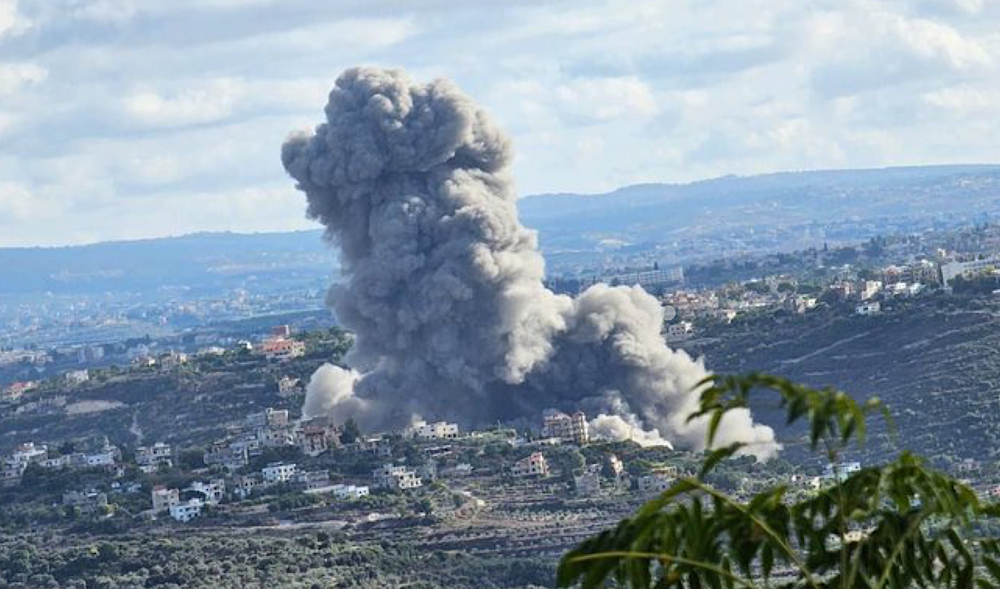Bishop Nahra: war with Lebanon, never-ending escalation at the expense of ordinary people
Over 100 people die and 400 are wounded in massive Israeli attacks in south Lebanon. Sources tell AsiaNews that Lebanese civilians are fleeing, sheltering in schools and government buildings. The patriarchal vicar for Israel says that even Nazareth was hit by rockets, and "it is likely" that the whole of Galilee will come under attack by Hezbollah. If leaders do not stop, the effects will be “terrible”. Christians are the weak link in this war as religious tourism dries up and violence spreads in Israel’s Arab community.
Nazareth (AsiaNews) – As of today, "a real war is underway" that is starting to affect "southern Lebanon” where today alone at least a hundred people died. “The situation is getting increasingly gloomy, and people are worried". As the conflict escalated over the past year, it “seems to never end,” this according to Lebanese-born Mgr Rafic Nahra, Auxiliary Bishop of the Latin Patriarchate of Jerusalem who has been the patriarchal vicar for Israel since 2021.
“Ordinary people,” he explains, “everywhere, from Gaza to the families of the hostages to the soldiers themselves pay the consequences," many of them are students and family men. “Now Lebanon, a country already suffering a lot,” is taking the brunt. “This is a source of deep concern.”
A massive attack by the Israeli military on Lebanon is currently underway with the Israeli military reporting that at least 300 Hezbollah targets were hit across the border. About a hundred people were killed, and 400 wounded, according to Lebanese estimates.
At a press briefing, IDF spokesman, Rear Admiral Daniel Hagari, when asked about a possible ground operation, did not rule it out. “The actions will continue until we achieve our goal to return the northern residents safely to their homes,” he added.
"It is entirely possible that the IDF will need to enter Lebanon on the ground," said former commander of the IDF General Staff Corps, Major-General (Res.) Gershon Hacohen.
In Lebanon, caretaker Prime Minister Najib Mikati, quoted by the newspaper An-Nahar, said that, “The continuing Israeli aggression on Lebanon is a war of extermination in every sense of the word and a destructive plan that aims to destroy Lebanese villages and towns.”
He called on “the United Nations and the General Assembly and influential countries... to deter the (Israeli) aggression.”
Sources in southern Lebanon spoke to AsiaNews about a massive exodus of civilians, with people finding shelters in schools and government buildings amid high tensions and enormous needs.
For its part, Hezbollah, the pro-Iranian Shia movement, said that it hit three targets in northern Israel, calling it a "response" to Israel’s intensive attacks.
Israel’s official broadcaster, KAN, is reporting that Israeli authorities are verifying reports that Hamas leader Yahya Sinwar was killed in recent IDF attacks in Gaza.
Reports of rocket attacks against Haifa and, for the first time since 2006, against Nazareth, which might be more heavily bombed in coming days, are signs that the conflict is widening
"For now we hear the rockets,” Bishop Nahra said. “Last night a fragment fell nearby. Now it is likely that the whole of Galilee will be attacked by the Lebanese Hezbollah in response to the Israeli military... It is clear to everyone that we are now facing an outright war.”
This will affect Gaza, the West Bank, and Lebanon, but other Shia armed groups in the region could intervene, in Iraq some are ready to intervene, which happened over the weekend, as well as the Houthis, who have been doing it for months from Yemen in what is increasingly becoming a regional conflict.
For the prelate, “It is clear that this war hurts on different levels: material damage, relationships between people, growing mistrust, and fear. All this must stop, otherwise the social impact will be terrible.”
"We hope that a solution will be reached and that the violence will stop. Such a task falls to leaders,” who have fanned the flames of conflict and tensions in recent months. "But they must turn in this direction and we pray to God, which is not just a cliché, so that this can happen.”
Unfortunately, Christians will pay for this since they are seen as the weak link in a chain that keeps the Middle East in a permanent conflict.
And the problem, for the prelate, is “not only the war and the absence of pilgrims. Violence is growing in the Arab (Israeli) community amid general silence, forcing people to flee.
"Since January 2024 alone, at least 175 people have been killed, not for ethno-religious reasons, nor in clashes between Christians and Muslims, but in crime-related incidents.”
Only a few days are left before the tragic anniversary of 7 October, when Hamas carried out the multiple terrorist attack in southern Israel that triggered the conflict in Gaza and, in a domino effect, fanned the flames of conflict in many parts of the region.
"We need to rebuild everything, in Israel and Palestine, and we will no longer be the same as before, even if it is hard to imagine the aftermath.
“Radicalisation has grown, and for this reason it is even more urgent for people of good will to work together, rebuild trust, everyone committed to work together – Christians, Jews, Muslims. But as long as there is violence, all this is but words ... We need a truce!”
03/01/2024 18:54
17/05/2021 10:29







.png)










